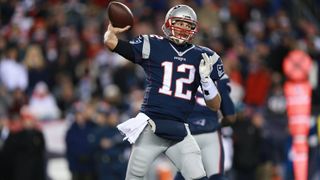S&P Global: Stock Market Follows Big Game

Pay TV industry research maven S&P Global Intelligence offered some interesting (and tongue-in-cheek) connections between the Super Bowl and the stock market to serve as food for thought as you watch the game this Sunday.
Recurring Champs Mean Big Returns for S&P 500 Index: The New England Patriots are five-time Super Bowl champs. When a former champion returns and wins the Super Bowl, the average market return is 13.2%.
More Offense Means More Money: Over the past 51 Super Bowls, the median combined final score or each game has been 46 points, according to S&P Global. When the teams in the Super Bowl combine to score at least 46 points, the stock market returns 16.6% on average (based on 27 years). If the final combined score is under 46, the average market return is just 6.3%.
First Time’s a Charm: While the Eagles have been to the big game before – they lost to the Oakland Raiders (27-10) in Super XV in 1980 and to the Patriots in 2005 (24-21) in Super Bowl XXXIX – they have never won it. According to S&P Global, an Eagles win would mean big gains for stocks – the average return in the market after a first time victory is 9.4% with the NFC averaging 15.9% while the AFC 2.2%
Playing Favorites: The market performs better on average after an NFC win 14.5% versus 8.9% after an AFC win.
Everybody Loves a Rematch: There have been 6 games that matched teams that met in an earlier Super Bowl. The average return in the year following each of those rematches was 18.8%.
Home is Where the Heart Is: When the home team wins the average market return in the subsequent years is 16.3% versus only 8.6% when the road team wins. The Patriots will have the home team designation in this year’s game.
Dome Casts a Shadow: This year’s game will be played indoors at the U.S. Bank Stadium in Minneapolis. Seventeen previous Super Bowls were played under a dome or with the retractable roof closed and the average market return was 6.6%. 34 Super Bowl games have been played at an open-air stadium or with the retractable roof open and the average S&P 500 return for those years is 14.3%.
Northern Chill Heats Up Markets: This will be the fifth time that the Super Bowl is played in a cold-weather city but the market seems warm to the idea – the average return in the year following each cold-weather city appearance is 14.9%. The market had a return of 7.6% when Super Bowl XXVI was played in the state of Minnesota.
Odds On Favorites: When the favored team wins the market responses with an average return of 13.1% versus 9.6% when the underdog pulls off the upset. No matter who wins the market likes it when the game goes “over” as the market responds with an average return of 16.7%
S&P Global also had some interesting facts on how each league’s performance impacts the market.
The market performs better on average after an NFC win returning on average 14.5% compared to 8.9% after an AFC win.
Both the best annual return (37.6% in 1995) and the worst return (-37.0 in 2008) occurred after an NFC victory.
While the NFC enjoys a better record during games played indoors (11-6) the market prefers the AFC as the market averages a 9% return after those AFC victories in games played indoors.
And since this is the Patriots’ tenth and the Eagles’ third trip to the Super Bowl dance, S&P Global offered a little more stat magic regarding the teams:
The New England Patriots (AFC) are 5-4 in their previous Super Bowl appearances.
When the Patriots win the Super Bowl the average market return in the subsequent years averages 3.4%
When the Patriots lose the Super Bowl the average market return in the subsequent years averages 7.7%
The Philadelphia Eagles (NFC) are 0-2 in the big game with losses in both Super Bowl XV and Super Bowl XXXIX. But the market was relatively indifferent in those losses, with an average return of 0.0% (Losing 4.9% after Super Bowl XV and gaining 4.9% after Super Bowl XXXIX).
Broadcasting & Cable Newsletter
The smarter way to stay on top of broadcasting and cable industry. Sign up below
